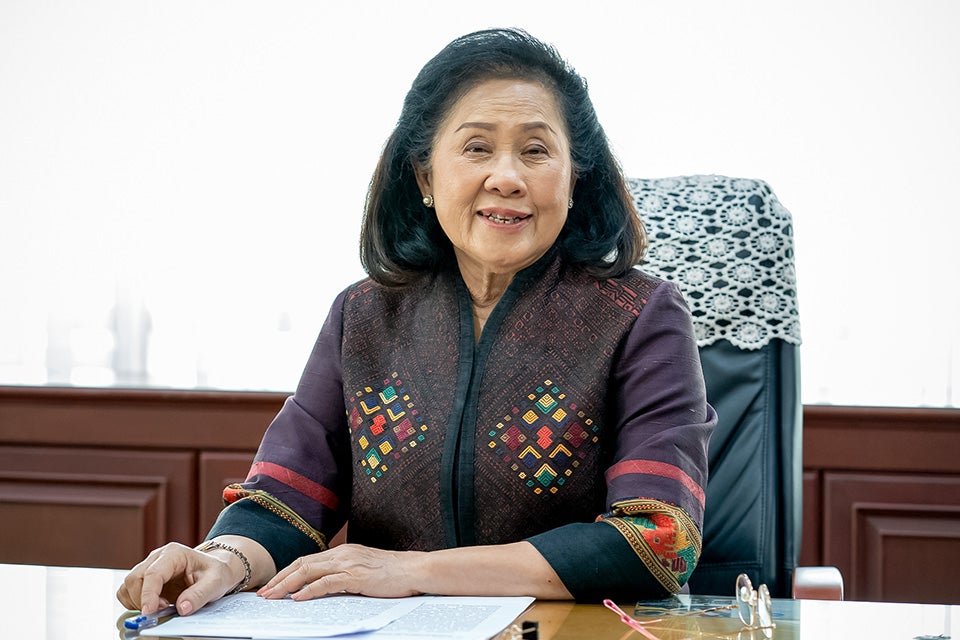Take Five: “During this coronavirus outbreak … nurse-midwives have had to sacrifice in the hospitals around the clock”
Date:
Interview* by Montira Narkvichien

Associate Professor Dr. Tassana Boontong is President of Thailand Nursing and Midwifery Council and Dean of Faculty of Nursing, HRH Chulabhorn College of Medical Sciences. She previously served as Vice-President, National Reform Council, 2014-2015; Senator, 2011-2014; Vice-President of the Senate, 2008-2011; Founding Dean of the Office of Nursing, Mae Fahluang University, 2006-2007; Founding Dean of the Faculty of Nursing, Srinakharinwirot University, 2003-2006; and Dean of the Faculty of Nursing, Mahidol University, 1987-1999.
Thailand Nursing and Midwifery Council was established in 1985, 35 years ago. Since then, what significant changes have you seen in nursing and midwifery in Thailand?
The profession has developed tremendously. It’s become autonomous, with self-governance, its own regulations, and a professional as President of the Council. All practitioners are mandated to register and renew their licenses every five years, to protect public safety. All nurse-midwife bachelor degree programmes are standardized based on criteria set by the Council and the curriculum standards are comparable to global standards.
In many countries, the professions of nursing and midwifery are separated. Why did Thailand combine them?
Thailand doesn’t have enough health workers, particularly at the primary level. If we deploy only a small number of health workers, these workers should be able to provide general health service in a holistic and comprehensive manner. So it was decided to combine the roles of nurse and midwife.
For more than a century, nurse-midwives have worked in the local communities and they have responded well to the health needs of people of all ages, throughout their life spans. We believe that nurse-midwives are needed now more than ever because of the increased numbers of elderly people, patients with non-communicable diseases, and those with chronic illnesses including mental disabilities.
What are the challenges nurse-midwives face daily and what are the additional challenges now, during the coronavirus pandemic?
Every day we face the persistent shortage of nurse-midwives, and their unequal distribution across the country. Although we have tried to resolve this with a mix-of-skills approach, the problems persist.
Especially in primary medical care, nurses provide humanistic services in remote areas where other medical professionals are not usually present. These contributions are overlooked and unrewarded.
During this coronavirus outbreak, workforce shortages have gotten worse and nurse-midwives have had to sacrifice in the hospitals around the clock and with limited personal protective equipment. They not only face the lethal disease but also mental stress, exhaustion, and worries about their families. Yet they choose to go on duty, to work for patients. And this while their own life insurance and work welfare still haven’t been clearly worked out.
Thailand has invested significantly in Universal Health Coverage. What more needs to be done, though, for the nurse-midwife profession? What advice would you give women who are considering joining the profession?
Universal Health Coverage promotes equal access to quality health care. Nurses have played a pivotal role in implementing the policy and have expanded outreach services to families and communities.
I wish to see a reformed health care system that values nursing services, invests more in nursing resources and personnel, recognizes their contributions, and gives them fair remuneration, wages and welfare, in return for their sacrifice and dedications. I wish to let the public know that nurses are the most efficient resource to invest in.
I would advise women of any age, not only those in high school, to consider taking up the profession -- with the confidence that they will be able to change the health of the world.
During your career, what experience affected you the most?
It was the Government’s support for my 10-Year Nursing Studies Development Plan. The Cabinet granted 2 billion baht, the most ever for the profession. As a result, the number of students admitted to nursing and midwifery programmes increased by 5,500; almost 800 teachers received scholarships to study for master’s degrees; and about 300 received scholarships to study for doctoral degrees abroad. Infrastructure and teaching equipment were strengthened as well. It made me realize that clear goals, strong leadership, high commitment, good teamwork and strong networking can make anything possible.
*Interview conducted in collaboration with WHO Thailand and UNFPA Asia and the Pacific